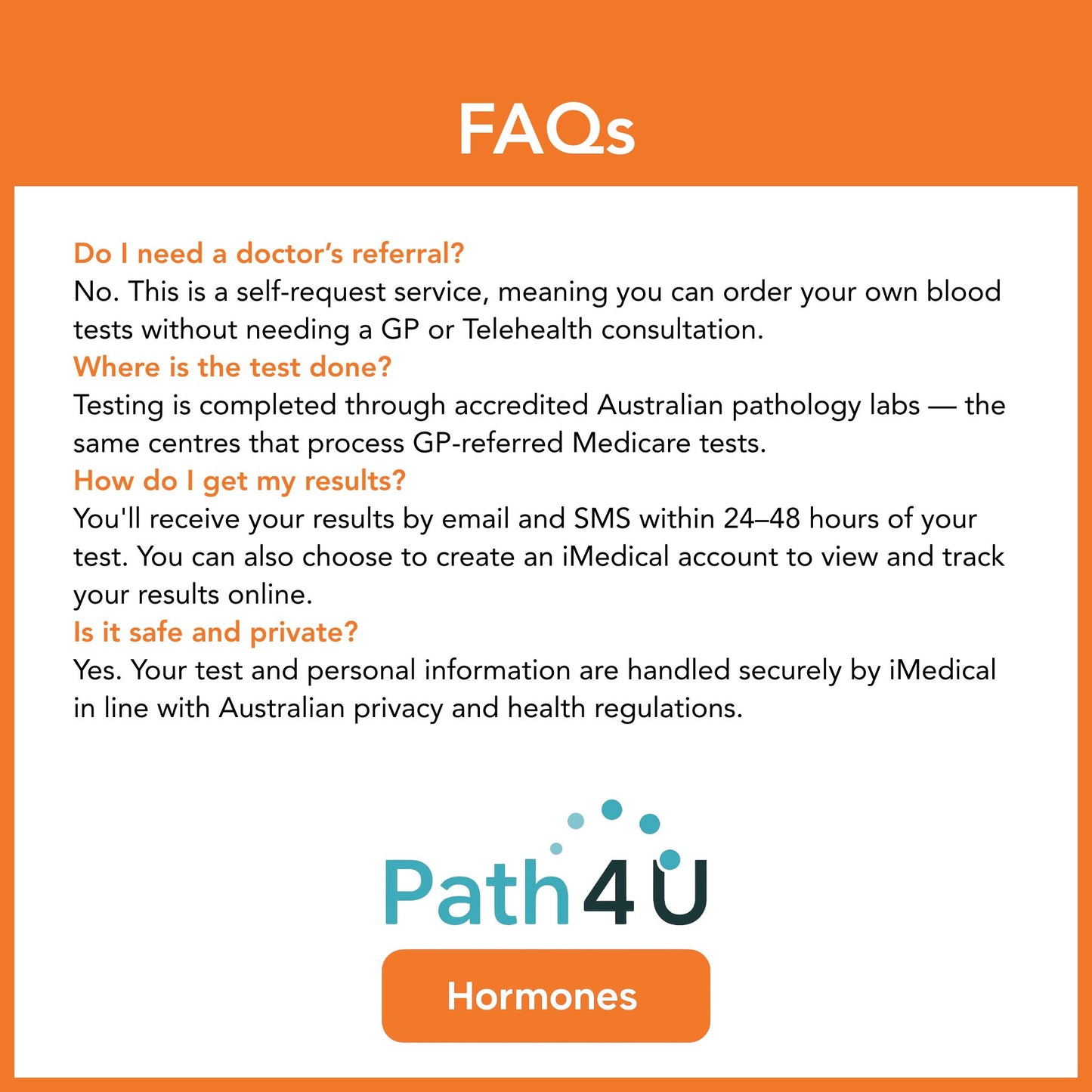iMedical
Path 4U: Hormones
Path 4U: Hormones
Partnering with iMedical for comprehensive medical and healthcare oversight. By clicking ‘Order Now via iMedical,’ you will be redirected to iMedical’s website to finalise your order.
Order a Hormones Blood Test without a GP Appointment
Skip the doctor's appointment - order your own lab grade blood tests quickly, easily and privately without a GP referral. Your health data in your hands. Testing is completed by the same pathology centres used for standard GP-ordered Medicare testing.
We offer a completely confidential, non-judgemental, blood testing service in NSW, VIC, QLD, WA, SA, NT, ACT and Tasmania. Our blood testing service can be arranged for you at a Collection Centre, close to you, anywhere in Australia.
Hormones Panel
Check your hormone balance to investigate symptoms like fatigue, mood swings, weight changes, libido issues or fertility concerns.
What's Included:
- Free and total Testosterone
- E2 (Oestradiol)
- SHBG
- Prolactin
- Progesterone
- FSH / LH
- DHEAS
- Cortisol
- IGF-1 + Growth hormone
ETA for results: 24-48 hours.
Fasting is NOT required for this test.
What’s the Process?
- iMedical will email you a Pathology request referral within seconds.
- Print off the referral and take it to any of the pathology collection centres listed on our collection centres page. No appointment necessary — just walk in with your referral.
- The pathology centre will process your test panel and iMedical will email and SMS your results within 24–48 hours.
- [Optional] You have the option of creating a customer profile and utilising the iMedical dashboard where you can view your test results at any time. Preview the Demonstration Customer Profile here to see what the dashboard looks like and view an example pathology test report.
FAQs
Do I need a doctor’s referral?
No. This is a self-request service, meaning you can order your own blood tests without needing a GP or Telehealth consultation.
Where is the test done?
Testing is completed through accredited Australian pathology labs — the same centres that process GP-referred Medicare tests.
How do I get my results?
You'll receive your results by email and SMS within 24–48 hours of your test. You can also choose to create an iMedical account to view and track your results online.
Is it safe and private?
Yes. Your test and personal information are handled securely by iMedical in line with Australian privacy and health regulations.
More Information
Testosterone: Testosterone is a steroid hormone that is produced by both men and women but is created in much larger quantities in men and is responsible for stimulating the development of male sexual characteristics. In a male fetus testosterone promotes the development of the penis, scrotum and other parts of a male reproductive system associated with sperm production.
Testosterone is also important for overall good health. It helps the growth of bones and muscles, and it affects mood, libido (sex drive) and certain aspects of mental ability.
Testosterone testing is commonly ordered for men who are experiencing erectile dysfunction, loss of muscle mass, fertility issues or decreased sex drive.
In women it also plays a role in libido, health and mood and is commonly used in HRT.
E2 (Oestradiol): This test measures Oestradiol levels in the blood. Oestradiol is one of the primary components of estrogens. Estradiol concentrations are typically highest in non-pregnant, pre-menopausal women. During menopause, as ovarian function decreases, Oestradiol levels drop significantly. Oestradiol testing can help to monitor ovarian function in women with fertility issues. It may also be useful for women undergoing hormone therapy during menopause or girls experiencing signs of early puberty.
Increased Oestradiol levels in men can cause gynecomastia (enlargement of the breast tissue), erectile dysfunction, increased abdominal fat, loss of muscle mass and/or emotional issues. Elevated oestrogens in men may also be associated with an increase in the risk of type 2 diabetes.
Sex Hormone Binding Globulin (SHBG): SHBG is a protein produced in the liver. It binds tightly to Testosterone, DHT and E2. These hormones are bound to SHBG and are regarded as biologically inactive. All non-SHBG-bound testosterone (FREE Testosterone) is therefore considered bio-available for tissue uptake.
Prolactin: This test measures the level of prolactin in the blood. Prolactin is a hormone produced by the pituitary gland whose primary role is in the production of breast milk. Prolactin levels are typically highest during pregnancy and shortly after childbirth. Abnormal prolactin levels may be caused by tumours on the pituitary gland. If left untreated, these can cause infertility in women and loss of sexual function in men.
In men, high prolactin can cause decreased sex drive, difficulty in getting an erection, breast tenderness or enlargement, and breast milk production (very rare).
Progesterone: This test measures progesterone levels in the blood. Progesterone is a steroid hormone whose primary purpose is to help prepare a woman's body for pregnancy. In men, low levels of progesterone are involved in the development of sperm. Progesterone testing is typically used to help evaluate the cause of infertility. It can also be used to monitor irregularities in a woman's menstrual cycle or monitor a pregnancy and identify potential complications.
This test is commonly ordered when a woman is having difficulty conceiving. It can also be done when a pregnant woman is experiencing symptoms of an ectopic pregnancy or miscarriage. Progesterone can also be monitored in women who are undergoing hormone replacement therapy to maintain a pregnancy. For women who are experiencing abnormalities in their menstrual cycle or irregular bleeding, progesterone can be ordered with additional tests such as FSH, LH, CBC, and quantitative hCG test for a more thorough analysis.
High progesterone levels in men cause an increase in estrogen production, which can lead to several problems. According to MayoClinic.com, excessive estrogen is linked to heart conditions, depression, and fatigue. Higher estrogen levels can lead to an enlarged prostate. Other side effects of an increase in estrogen caused by high progesterone levels include prostate inflammation, urination difficulties and erectile dysfunction.
Please note that progesterone levels in patients taking DHEA may be falsely increased due to assay interference.
FSH (Follicle Stimulating Hormone): FSH stimulates the follicles in the ovaries to ripen several eggs. A follicle is a balloon-shaped structure filled with fluid that contains an egg. FSH also stimulates the ovaries to produce oestrogen.
The pre-ovulatory phase is the phase between bleeding and ovulation and tends to be more variable than the second half of the menstrual cycle. Although about 20 follicles begin developing each menstrual cycle due to FSH release, only one follicle reaches full maturity. As the follicles develop they release estrogen, which in turn feeds back to the brain and causes the pituitary gland to stop producing FSH. The follicle that has matured the most survives and continues to grow until it is ready for ovulation. The other less mature follicles stop growing (and some even die).
FSH also readies the mammary glands for milk production. In men, FSH initiates sperm production.
LH (Luteinising Hormone): LH is secreted by the pituitary gland to stimulate ovulation — the release of the egg from the follicle. LH also signals the remnants of the follicle to change into the corpus luteum, which then begins producing progesterone and estrogens.
In men, LH signals the testicles to produce testosterone. The brain monitors blood testosterone levels and adjusts LH output accordingly. Chronic low testosterone results in increased LH, while testosterone supplementation or steroid use can suppress LH production. Stopping supplementation abruptly may lead to a testosterone “crash.”
DHEAS (Dehydroepiandrosterone Sulfate): DHEAS is a male sex hormone produced primarily by the adrenal glands. It is also produced in smaller amounts in the ovaries or testicles. Elevated DHEA can be caused by adrenal tumors or, in some cases, ovarian tumors. Excess DHEA can cause early puberty in young boys or the absence of menstrual periods or the development of male characteristics such as a deeper voice or excess facial or body hair in women.
This test is typically ordered to evaluate adrenal function or when a person shows symptoms of excess androgen. For women, it may help identify causes of infertility or irregular cycles. For men, it's often ordered alongside testosterone.
Please note that biotin (vitamin B7) supplements may falsely elevate DHEA-S results.
Cortisol: Cortisol is a hormone that affects many functions in the body. It helps control blood sugar levels, regulate metabolism, reduce inflammation, support memory, and maintain salt and water balance. It plays a major role in stress response.
Growth Hormone (GH): GH (or human growth hormone) is a peptide hormone that stimulates growth, cell reproduction, and regeneration. It also influences metabolism by increasing glucose and fatty acid levels. GH stimulates production of IGF-1. Levels fluctuate naturally — rising during fasting and stress, and dropping after meals.
Disclaimer
We Test Bio partners with iMedical to offer these products. By clicking ‘Buy Now,’ you will be redirected to iMedical’s website, where all purchases, personal information (e.g., name, address), and pathology product orders are securely processed and managed by iMedical in compliance with Australian Privacy Principles (APPs) and health regulations. We Test Bio does not collect, store, or process your personal or health information during this transaction. If iMedical shares limited order details with us (e.g., for tracking purposes), we protect it securely and use it only to support your experience, as outlined in our Privacy Policy. For privacy enquiries, see our Privacy Policy or contact iMedical directly.
Share






